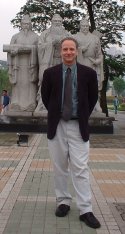Chewing Gum and Education
It may not be immediately obvious what Wrigley's, the world's biggest gum-maker, can teach us about the future of education in a WTO/GATS-world. There is a lesson to be learned, though, and it is not a happy one for those who feel that learning is inextricably tied to the cultural values of the learners.
The title of the lesson is something like: Free Trade Defeats Local Standards.
Is there a better known local regulation, a more idiosyncratic, poked-fun-at local rule anywhere in the world than Singapore's edicts against chonking on chickle? Tell someone you're about to travel to Singapore and chances are the first reaction will be, "you'd better not chew gum, dude, or you'll wind up in the slammer." I know this is the case because I have travelled to the City State more than once, and have been issued this warning over and over by people who don't even know where the country is located -- but they are well aware that chewing can be hazardous to your personal freedom in the tiny but prosperous nation.
Hazardous that is, until the recent Free Trade Agreement (FTA) between Singapore and the United States. FTAs are designed to promote economic activity by removing barriers to commerce. And Wrigley, a Chicago-based corporation with considerable political influence in the US Congress, wanted Singaporean jaws working on its products, and paying real money for the privilege. From a Free Trade perspective, Wrigley should feel this way. The Free Trade philosophy regards as barriers many local features that can also be seen as distinctive aspects of a particular culture.
It is not illegal to chew gum in Singapore, never has been. It has been illegal, however, since 1992 to import or sell gum for the very basic reason that it costs a lot of money to clean up all the used up pieces that human beings everywhere spit out and leave behind. What's the cost; what's the benefit?
Here's a distinctive feature of Singapore, a feature that shapes the national character in certain understandable ways: There's no margins. Singapore has no food, no water, no natural resources, and no more space left to use. If it was a city, that would be one thing. But we're talking about a whole country here. The point is, they can't screw around. If there is no good reason to let people make their seemingly unavoidable gum-mess, they shouldn't be allowed to do it. There is simply no room for that kind of indulgence. No margins. It's a Singapore-thing.
But even Singapore-things, apparently, cannot resist the inherent dynamics of Free Trade. The FTA might not have been finalized, Wrigley's political connections are that strong and well-placed. It was getting to be an either/or, and Singapore rolled over for the FTA. No, they're not going to be selling Doublemint packs at the hawker centers any time real soon. The door was not opened all the way, just enough to let in two brands of sugarless over the counter without a perscription, because they are purported to have therapeutic benefits and are being treated as health products.
Switch to education and pick a country, any country. They've all got distinctive features, features which translate into educational curriculum and methods in very clear and discernable ways. In the US, for instance, the strong identity of each of the 50 states leads to distinctive emphases in the way American history is taught. From the perspective of a private e-vendor selling History learning objects, these distinctive emphases are a barrier to the market penetration of learning objects which embody a more generic view point, in order to appeal to the largest possible market without modification.
If the perceived need for an FTA can compell Singapore to rescind it's chewing gum bans, it can compell just about any country to back away from precious national values. In order to make the world safe for generic mass produced education, nothing is safe, nothing is sacred. I find this frightening.
. . .

